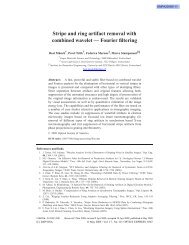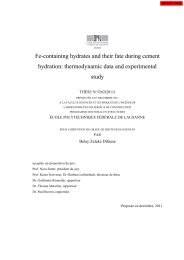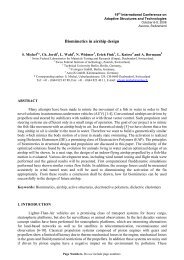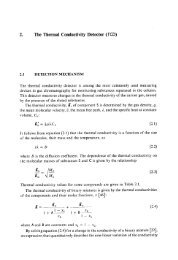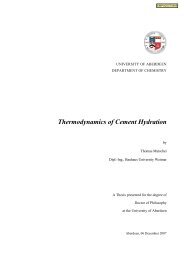Entire volume - Eawag
Entire volume - Eawag
Entire volume - Eawag
Create successful ePaper yourself
Turn your PDF publications into a flip-book with our unique Google optimized e-Paper software.
The North Atlantic Oscillation<br />
Does it Affect the Timing of Break-up<br />
of Northern Hemisphere Lakes?<br />
The North Atlantic Oscillation is a large-scale climate phenomenon<br />
that affects the climate of much of the northern hemisphere in<br />
winter and spring. EAWAG found that it also affects the timing of<br />
ice break-up on northern hemisphere lakes. The area of influence<br />
of the North Atlantic Oscillation has shifted over the past 130<br />
years, with an increase in its influence in Siberia and a decrease<br />
in North America.<br />
Climate over the North Atlantic is generally<br />
dominated by the simultaneous existence of<br />
an area of low surface air pressure centered<br />
on Iceland (the Iceland Low) and an area of<br />
high surface air pressure extending approximately<br />
from the Azores to the Iberian peninsula<br />
(the Azores High) (Fig. 1). The resulting<br />
large-scale north-south gradient in surface<br />
air pressure between these two pressure<br />
23 EAWAG news 58<br />
Wind direction<br />
L<br />
1000<br />
1004<br />
1008<br />
1012<br />
1016<br />
centers is of course not constant, but varies<br />
according to their strength. This variation in<br />
the meridional pressure gradient over the<br />
North Atlantic is known as the North Atlantic<br />
Oscillation (NAO). The NAO is directly responsible<br />
for a great deal of the interannual<br />
variability in climate experienced by the land<br />
areas bordering the North Atlantic, but is<br />
also associated with the climate variability<br />
Fig. 1: The mean sea-level air pressure distribution over the North Atlantic in January (1941–1970), showing the Iceland<br />
Low, the Azores High and the prevailing direction of the winds blowing across Europe from the North Atlantic.<br />
Adapted from [2].<br />
H<br />
1021<br />
1020<br />
occurring over a large part of the rest of the<br />
Northern Hemisphere, especially at high latitudes<br />
[1]. The mean air temperature of the<br />
northern hemisphere, for instance, is linked<br />
to the NAO, and almost a third of the interannual<br />
variance in the mean air temperature<br />
can be explained statistically by the NAO.<br />
The influence of the NAO on the northern<br />
hemisphere climate is especially strong in<br />
winter and spring.<br />
The Meteorological<br />
Significance of the NAO<br />
The NAO is commonly represented in terms<br />
of an index (Fig. 2) based on the difference<br />
of the sea-level air pressure measured at a<br />
meteorological station close to the center<br />
of the Azores High and that measured at a<br />
station in Iceland [1]. A high pressure difference<br />
results in a positive index and a low<br />
pressure difference in a negative index.<br />
High winter NAO indices indicate a steep<br />
meridional (i.e., north-south) pressure gradient<br />
over the North Atlantic. This results in<br />
strong westerly winds that transport warm,<br />
moist maritime air eastwards across Europe<br />
(Fig. 1), giving rise to mild, wet winters in<br />
Europe and much of central Asia. Low winter<br />
NAO indices indicate a relatively weak<br />
meridional pressure gradient with correspondingly<br />
weak westerlies over the North<br />
Atlantic and colder, drier winters in Europe.<br />
In eastern Canada the situation is the opposite,<br />
with high NAO indices being associated<br />
with strong northerly winds and cold winters,<br />
and low NAO indices being associated<br />
with weaker northerly winds and warmer<br />
winters. Rare winter reversals of the normal<br />
pressure distribution over the North Atlantic<br />
(i.e., high pressure over Iceland and low



